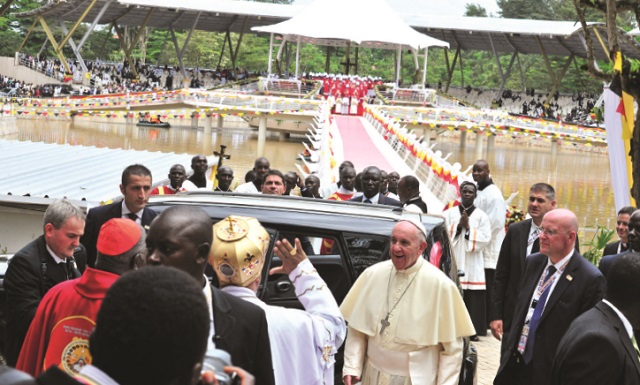
Hundreds of thousands of Christians once again are making the annual pilgrimage to Namugongo Martyrs Shrines to commemorate the 45 Christian young men (recognized in the spirit of Christian unity or ecumenism as 22 Catholics and 23 Anglicans) who were killed by KabakaMwanga II in 1886.
These martyrs are among the most famous around the world and commemoration of their death on Uganda Martyrs Day, June 3, every year rekindles debate on the meaning and relevancy of martyrdom; especially in modern times. So who exactly are the martyrs and what does it mean to be a martyr?
The word ‘martyr’ comes from a Greek word “martur” meaning ‘witness’, which in turn is a religious term meaning someone who stands by what they believe even up to the point of suffering death. Since many generations of early and modern day Christians have witnessed to the point of death, for many people, the word “martyr” has come to signify suffering or dying due to one’s religious or other belief.
However, although martyrdom entails death—which the executioners hope will annihilate the efforts of the martyr—it also involves transformation.
“This transformation always involves the building of the church but also involves justice and reconciliation in politics, society and relations among churches and religions,” according to one scholar. Christians point at the writings of Quintus Septimius Florens Tertullianus, the early Christian author from Carthage, Tunisia (160 AD – 220 AD), then part of the Roman Empire to make this point. Tertullianus wrote: “the blood of martyrs is the seed of the church.” Today’s martyrs built the church as well, according to the scholars.
These days, the use of the term “martyr” almost always involves an individual choosing to die, rather than deny their faith and this is actually true for the two religions, Christianity and Islam.
There are scholars who insist that the story of the Uganda martyrs is incomplete without talking about the Muslim martyrs who were murdered a decade earlier by Muteesa I— Mwanga’s father.
Islam had come to Buganda much earlier than Christianity in 1844, thanks to the Arab traders who converted many people in Buganda. The king, Kabaka Muteesa I, is said to have `converted’ although he refused to be circumcised.
However, as Islam took root in Buganda, Muteesa started wondering why the Arab Muslims and their converts were not coming for prayers which he used to lead in his palace. Muteesa was also angered when Muslims started rejecting the meat that had been prepared in a non-Islamic way in the palace. Finally, the Kabaka who was used to being treated as above everyone and everything in Buganda was angered that the converts were taught that Allah was the supreme God and not the Kabaka.
Historians say a combination of these factors led to the execution of over 70 Muslims—most of them at the same guillotine in Namugongo—an act which qualifies them to be the very first martyrs in Uganda.
In a 2002 essay: “Of Neighbours and Infidels: The Meaning of Martyrdom for Christians and Muslims” in Lay Witness, a flagship Catholic publication in North America, Donald DeMarco, a professor emeritus at St. Jerome’s University at Waterloo, Ontario, Canada noted that although the expression “martyr,” in both Christianity and Islam, means “witness,” the meaning of martyrdom is fundamentally different for Christians and Muslims.
In Christian history, there are thousands of people who have chosen death in order to preserve their religious beliefs. Still, while they may aspire to lead lives of holiness, it takes others –notably the church to designate some as martyrs.
 The Independent Uganda: You get the Truth we Pay the Price
The Independent Uganda: You get the Truth we Pay the Price



